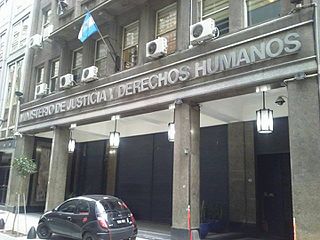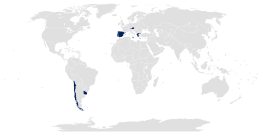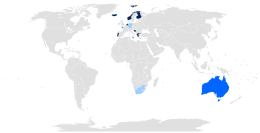
In law, sex characteristic refers to an attribute defined for the purposes of protecting individuals from discrimination due to their sexual features. The attribute of sex characteristics was first defined in national law in Malta in 2015. The legal term has since been adopted by United Nations, European, and Asia-Pacific institutions, and in a 2017 update to the Yogyakarta Principles on the application of international human rights law in relation to sexual orientation, gender identity, gender expression and sex characteristics.

The National Institute Against Discrimination, Xenophobia and Racism was a state agency of the Government of Argentina which is charged with receiving complaints and pursuing charges against citizens accused of acts of discrimination or hatred. Created in 1995 by Federal Law 24515, INADI is considered one of Argentina's National human rights institutions. On 22 February 2024, the government of Javier Milei announced that it would close INADI permanently.
Advocates for Informed Choice, dba interACT or interACT Advocates for Intersex Youth, is a 501(c)(3) nonprofit organization advocating for the legal and human rights of children with intersex traits. The organization was founded in 2006 and formally incorporated on April 12, 2010.

Mauro Cabral Grinspan, also known as Mauro Cabral, is an Argentinian intersex and trans activist, who serves as the Senior Officer for Gender Justice and Equity at the Global Philanthropy Project. Before that, he was the Executive Director of GATE. His work - as a signatory of the Yogyakarta Principles - focuses on the reform of medical protocols and law reform. In July 2015, Cabral received the inaugural Bob Hepple Equality Award.
Zwischengeschlecht is a human rights advocacy group campaigning on intersex bodily autonomy issues. The group demonstrates outside medical events where surgical interventions are discussed or performed, engages with the media, and participates in consultations with human rights institutions.

Intersex, in humans and other animals, describes variations in sex characteristics including chromosomes, gonads, sex hormones, or genitals that, according to the UN Office of the High Commissioner for Human Rights, "do not fit typical binary notions of male or female bodies".

Intersex people are born with sex characteristics, such as chromosomes, gonads, or genitals, that, according to the UN Office of the High Commissioner for Human Rights, "do not fit typical binary notions of male or female bodies."

The Ministry of Justice of Argentina is a ministry of the national executive power tasked with enforcing of the law and administration of justice.

Intersex people are born with sex characteristics, such as chromosomes, gonads, or genitals that, according to the United Nations Office of the High Commissioner for Human Rights, "do not fit typical binary notions of male or female bodies".

Intersex people are born with sex characteristics, such as chromosomes, gonads, or genitals that, according to the UN Office of the High Commissioner for Human Rights, "do not fit typical binary notions of male or female bodies". "Because their bodies are seen as different, intersex children and adults are often stigmatized and subjected to multiple human rights violations".

Intersex people are born with sex characteristics that "do not fit the typical definitions for male or female bodies". They are substantially more likely to identify as lesbian, gay, bisexual, or transgender (LGBT) than endosex people. According to a study done in Australia of Australian citizens with intersex conditions, participants labeled 'heterosexual' as the most popular single label with the rest being scattered among various other labels. According to another study, an estimated 8.5% to 20% experiencing gender dysphoria. Although many intersex people are heterosexual and cisgender, this overlap and "shared experiences of harm arising from dominant societal sex and gender norms" has led to intersex people often being included under the LGBT umbrella, with the acronym sometimes expanded to LGBTI. Some intersex activists and organisations have criticised this inclusion as distracting from intersex-specific issues such as involuntary medical interventions.

The Malta declaration is the statement of the Third International Intersex Forum, which took place in Valletta, Malta, in 2013. The event was supported by the ILGA and ILGA-Europe and brought together 34 people representing 30 organisations from multiple regions of the world.

Intersex people in the United Kingdom face significant gaps in legal protections, particularly in protection from non-consensual medical interventions, and protection from discrimination. Actions by intersex civil society organisations aim to eliminate unnecessary medical interventions and harmful practices, promote social acceptance, and equality in line with Council of Europe and United Nations demands. Intersex civil society organisations campaign for greater social acceptance, understanding of issues of bodily autonomy, and recognition of the human rights of intersex people.

Since November 7, 2023, Chile bans unnecessary and non-consensual surgeries, procedures or medical treatments on intersex newborns, boys, girls and adolescents. Since March 15, 2022, Chile bans discrimination based on "sex characteristics" under Law 21,430 on Guarantees and Integral Protection of the Rights of Children and Adolescents. The country has the most advanced legal protection framework in Latin America.

In 1999, the Constitutional Court of Colombia became the first court to consider the human rights implications of medical interventions to alter the sex characteristics of intersex children. The Court restricted the age at which intersex children could be the subjects of surgical interventions.

Intersex people are born with sex characteristics, such as chromosomes, gonads, hormones, or genitals that, according to the UN Office of the High Commissioner for Human Rights, "do not fit the typical definitions for male or female bodies". Such variations may involve genital ambiguity, and combinations of chromosomal genotype and sexual phenotype other than XY-male and XX-female.

In Mexico there are no explicit rights reserved to intersex persons, no protections from non-consensual cosmetic medical interventions on intersex children and no legislative protection from discrimination. Intersex persons may have difficulties in obtaining necessary health care.

Intersex people in Switzerland have no recognition of rights to physical integrity and bodily autonomy, and no specific protections from discrimination on the basis of sex characteristics. In 2012, the Swiss National Advisory Commission on Biomedical Ethics published a report on the medical management of differences of sex development or intersex variations.

Citizens of Spain who are intersex face problems that the wider society does not encounter. Laws that provide protection against discrimination or genital mutilation for intersex people exist only in some autonomous communities rather than on a national level. The 3/2007 law is the current law in Spain which relates to legal gender change including the rights of intersex people, although a new law is about to be passed in the near future.

Alba Rueda is an Argentine politician who became the first openly transgender politician in Argentina to hold a senior governmental position when she served as the Undersecretary of Diversity Policies within the Ministry of Women, Genders and Diversity between January 2020 and May 2022.















